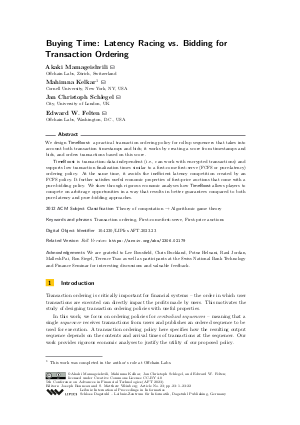Buying Time: Latency Racing vs. Bidding for Transaction Ordering
Authors Akaki Mamageishvili, Mahimna Kelkar, Jan Christoph Schlegel, Edward W. Felten
-
Part of:
Volume:
5th Conference on Advances in Financial Technologies (AFT 2023)
Part of: Series: Leibniz International Proceedings in Informatics (LIPIcs)
Part of: Conference: Advances in Financial Technologies (AFT) - License:
 Creative Commons Attribution 4.0 International license
Creative Commons Attribution 4.0 International license
- Publication Date: 2023-10-18
File

PDF
LIPIcs.AFT.2023.23.pdf
- Filesize: 0.7 MB
- 22 pages
Document Identifiers
Related Versions
- Full Version https://arxiv.org/abs/2306.02179
Subject Classification
ACM Subject Classification
- Theory of computation → Algorithmic game theory
Keywords
- Transaction ordering
- First-come-first-serve
- First-price auctions
Metrics
- Access Statistics
-
Total Accesses (updated on a weekly basis)
0PDF Downloads0Metadata Views
Abstract
We design TimeBoost: a practical transaction ordering policy for rollup sequencers that takes into account both transaction timestamps and bids; it works by creating a score from timestamps and bids, and orders transactions based on this score. TimeBoost is transaction-data-independent (i.e., can work with encrypted transactions) and supports low transaction finalization times similar to a first-come first-serve (FCFS or pure-latency) ordering policy. At the same time, it avoids the inefficient latency competition created by an FCFS policy. It further satisfies useful economic properties of first-price auctions that come with a pure-bidding policy. We show through rigorous economic analyses how TimeBoost allows players to compete on arbitrage opportunities in a way that results in better guarantees compared to both pure-latency and pure-bidding approaches.
Cite As Get BibTex
Akaki Mamageishvili, Mahimna Kelkar, Jan Christoph Schlegel, and Edward W. Felten. Buying Time: Latency Racing vs. Bidding for Transaction Ordering. In 5th Conference on Advances in Financial Technologies (AFT 2023). Leibniz International Proceedings in Informatics (LIPIcs), Volume 282, pp. 23:1-23:22, Schloss Dagstuhl – Leibniz-Zentrum für Informatik (2023)
https://doi.org/10.4230/LIPIcs.AFT.2023.23
BibTex
@InProceedings{mamageishvili_et_al:LIPIcs.AFT.2023.23,
author = {Mamageishvili, Akaki and Kelkar, Mahimna and Schlegel, Jan Christoph and Felten, Edward W.},
title = {{Buying Time: Latency Racing vs. Bidding for Transaction Ordering}},
booktitle = {5th Conference on Advances in Financial Technologies (AFT 2023)},
pages = {23:1--23:22},
series = {Leibniz International Proceedings in Informatics (LIPIcs)},
ISBN = {978-3-95977-303-4},
ISSN = {1868-8969},
year = {2023},
volume = {282},
editor = {Bonneau, Joseph and Weinberg, S. Matthew},
publisher = {Schloss Dagstuhl -- Leibniz-Zentrum f{\"u}r Informatik},
address = {Dagstuhl, Germany},
URL = {https://drops.dagstuhl.de/entities/document/10.4230/LIPIcs.AFT.2023.23},
URN = {urn:nbn:de:0030-drops-192120},
doi = {10.4230/LIPIcs.AFT.2023.23},
annote = {Keywords: Transaction ordering, First-come-first-serve, First-price auctions}
}
Author Details
Acknowledgements
We are grateful to Lee Bousfield, Chris Buckland, Potuz Heluani, Raul Jordan, Mallesh Pai, Ron Siegel, Terence Tsao as well as participants at the Swiss National Bank Technology and Finance Seminar for interesting discussions and valuable feedback.
References
-
Kushal Babel and Lucas Baker. Strategic peer selection using transaction value and latency. In DeFi @ CCS, pages 9-14, 2022.

-
Kushal Babel, Philip Daian, Mahimna Kelkar, and Ari Juels. Clockwork finance: Automated analysis of economic security in smart contracts. In IEEE S&P, pages 2499-2516, 2023.

-
Christian Cachin, Jovana Micic, and Nathalie Steinhauer. Quick order fairness. In FC, 2022.

-
Georg Cantor. Beiträge zur begründung der transfiniten mengenlehre. Mathematische Annalen, pages 481-512, 1895.

-
Christopher P Chambers and Federico Echenique. Revealed preference theory, volume 56. Cambridge University Press, 2016.

-
Philip Daian, Steven Goldfeder, Tyler Kell, Yunqi Li, Xueyuan Zhao, Iddo Bentov, Lorenz Breidenbach, and Ari Juels. Flash boys 2.0: Frontrunning in decentralized exchanges, miner extractable value, and consensus instability. In IEEE S&P, pages 585-602, 2020.

-
Gerard Debreu. Representation of a preference ordering by a numerical function. Decision processes, 3:159-165, 1954.

- Mahimna Kelkar, Soubhik Deb, Sishan Long, Ari Juels, and Sreeram Kannan. Themis: Fast, strong order-fairness in byzantine consensus. IACR Cryptol. ePrint Arch., page 1465, 2021. URL: https://eprint.iacr.org/2021/1465.
-
Mahimna Kelkar, Fan Zhang, Steven Goldfeder, and Ari Juels. Order-fairness for Byzantine consensus. In CRYPTO, pages 451-480, 2020.

-
Vijay Krishna. Auction Theory. Academic Press, 2002.

-
Klaus Kursawe. Wendy, the good little fairness widget: Achieving order fairness for blockchains. In ACM AFT, pages 25-36, 2020.

-
Eric Maskin and John Riley. Uniqueness of equilibrium in sealed high-bid auctions. Games and Economic Behavior, 45(2):395-409, 2003.

-
Ciamac C. Moallemi and Mehmet Saglam. OR forum - the cost of latency in high-frequency trading. Oper. Res., 61(5):1070-1086, 2013.

-
Roger B. Myerson. Optimal auction design. Math. Oper. Res., 6(1):58-73, 1981.

-
Kaihua Qin, Liyi Zhou, and Arthur Gervais. Quantifying blockchain extractable value: How dark is the forest? In IEEE S&P, pages 198-214, 2022.

-
Ron Siegel. All‐pay contests. Econometrica, 77:71-92, 2009.

-
Weizhao Tang, Lucianna Kiffer, Giulia Fanti, and Ari Juels. Strategic latency reduction in blockchain peer-to-peer networks. Proc. ACM Meas. Anal. Comput. Syst., 7(2):32:1-32:33, 2023.

- Anton Wahrstätter, Liyi Zhou, Kaihua Qin, Davor Svetinovic, and Arthur Gervais. Time to bribe: Measuring block construction market, 2023. URL: https://arxiv.org/abs/2305.16468.
- Sen Yang, Fan Zhang, Ken Huang, Xi Chen, Youwei Yang, and Feng Zhu. Sok: Mev countermeasures: Theory and practice, 2022. URL: https://arxiv.org/abs/2212.05111.
-
Yunhao Zhang, Srinath Setty, Qi Chen, Lidong Zhou, and Lorenzo Alvisi. Byzantine ordered consensus without Byzantine oligarchy. In OSDI, pages 633-649, 2020.

